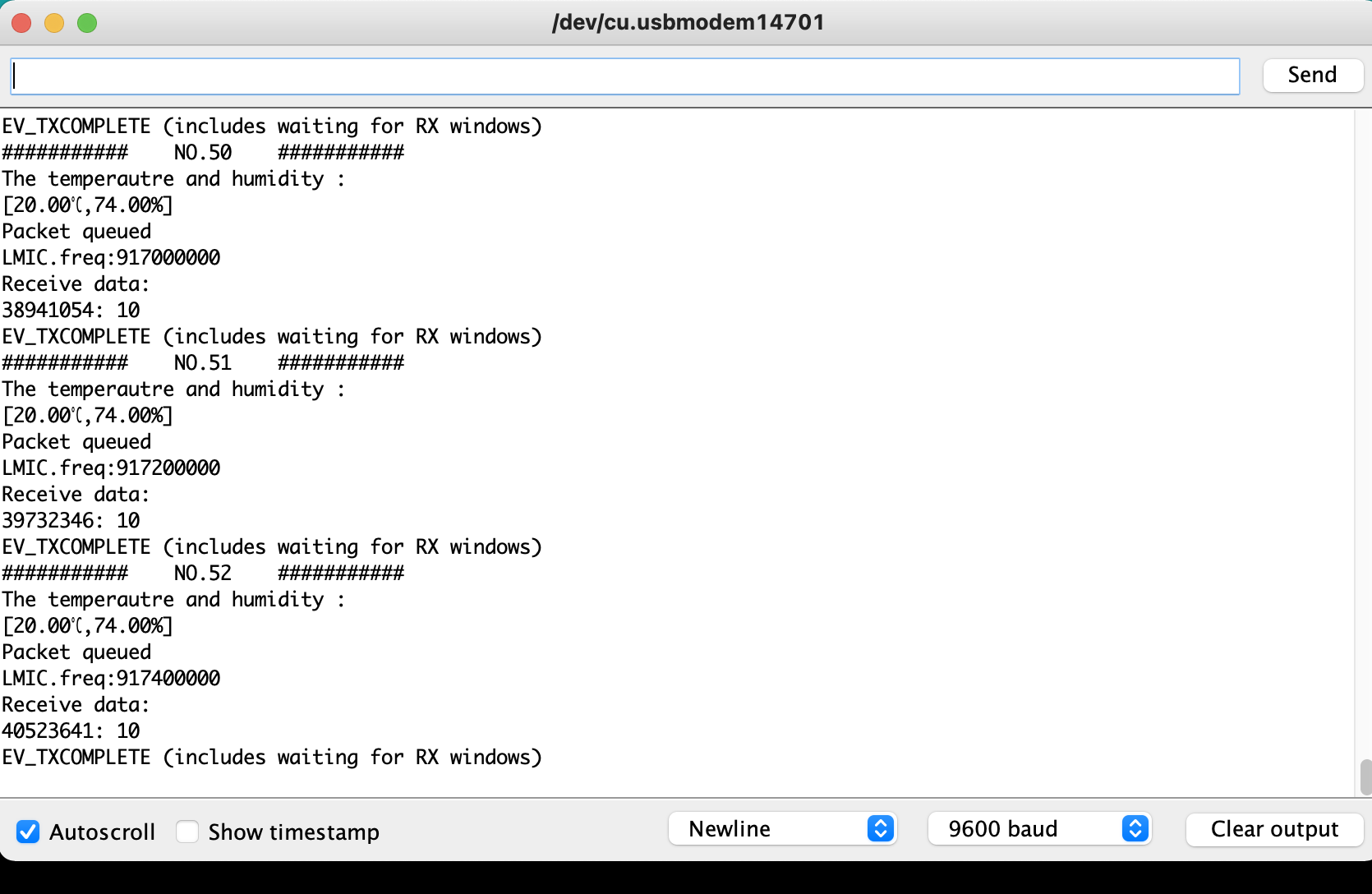Hi there,
I am trying to decode the DHT11 data on the things network and integrate it to thingspeak. i am having an issue with decoding the payload.
function Decoder(bytes, port)
{
var tem = (bytes[2]<<8) | bytes[3];
var hum = (bytes[6])*2;
return {
field3: tem,
field4: hum
}
}
Following is the sketch:
#include <lmic.h>
#include <dht.h>
#include <hal/hal.h>
#include <SPI.h>
dht DHT;
#define DHT11_PIN 5
#define PIN_A A0
float temperature,humidity;
float tem,hum;
unsigned int count = 1; //For times count
String datastring1="";
String datastring2="";
String datastring3="";
static uint8_t mydata[11] = {0x01,0x67,0x00,0x00,0x02,0x68,0x00,0x03,0x65,0x00,0x00};
/* LoRaWAN NwkSKey, network session key
This is the default Semtech key, which is used by the prototype TTN
network initially.
ttn*/
static const PROGMEM u1_t NWKSKEY[16] = { 0x72, 0x13, 0xF8, 0xF0, 0x9A, 0x3C, 0xF9, 0xE5, 0xE6, 0x01, 0xDA,0xAC, 0x32, 0xBA, 0x37 };
/* LoRaWAN AppSKey, application session key
This is the default Semtech key, which is used by the prototype TTN
network initially.
ttn*/
static const u1_t PROGMEM APPSKEY[16] = { 0x2F, 0xF5, 0xF4, 0x08, 0x4E, 0x37, 0x20, 0x02, 0xBA, 0x2B, 0xED, 0x40, 0x24, 0xA2, 0x945 };
/*
LoRaWAN end-device address (DevAddr)
See http://thethingsnetwork.org/wiki/AddressSpace
ttn*/
static const u4_t DEVADDR = 0x260D0CA5;
/* These callbacks are only used in over-the-air activation, so they are
left empty here (we cannot leave them out completely unless
DISABLE_JOIN is set in config.h, otherwise the linker will complain).*/
void os_getArtEui (u1_t* buf) { }
void os_getDevEui (u1_t* buf) { }
void os_getDevKey (u1_t* buf) { }
static osjob_t initjob,sendjob,blinkjob;
/* Schedule TX every this many seconds (might become longer due to duty
cycle limitations).*/
const unsigned TX_INTERVAL = 10;
// Pin mapping
const lmic_pinmap lmic_pins = {
.nss = 10,
.rxtx = LMIC_UNUSED_PIN,
.rst = 9,
.dio = {2, 6, 7},
};
void do_send(osjob_t* j){
// Check if there is not a current TX/RX job running
if (LMIC.opmode & OP_TXRXPEND) {
Serial.println("OP_TXRXPEND, not sending");
} else {
dhtTem();
light();
// Prepare upstream data transmission at the next possible time.
// LMIC_setTxData2(1,datasend,sizeof(datasend)-1,0);
LMIC_setTxData2(1, mydata, sizeof(mydata), 0);
Serial.println("Packet queued");
Serial.print("LMIC.freq:");
Serial.println(LMIC.freq);
Serial.println("Receive data:");
}
// Next TX is scheduled after TX_COMPLETE event.
}
void onEvent (ev_t ev) {
Serial.print(os_getTime());
Serial.print(": ");
Serial.println(ev);
switch(ev) {
case EV_SCAN_TIMEOUT:
Serial.println(F("EV_SCAN_TIMEOUT"));
break;
case EV_BEACON_FOUND:
Serial.println(F("EV_BEACON_FOUND"));
break;
case EV_BEACON_MISSED:
Serial.println(F("EV_BEACON_MISSED"));
break;
case EV_BEACON_TRACKED:
Serial.println(F("EV_BEACON_TRACKED"));
break;
case EV_JOINING:
Serial.println(F("EV_JOINING"));
break;
case EV_JOINED:
Serial.println(F("EV_JOINED"));
break;
case EV_RFU1:
Serial.println(F("EV_RFU1"));
break;
case EV_JOIN_FAILED:
Serial.println(F("EV_JOIN_FAILED"));
break;
case EV_REJOIN_FAILED:
Serial.println(F("EV_REJOIN_FAILED"));
break;
case EV_TXCOMPLETE:
Serial.println(F("EV_TXCOMPLETE (includes waiting for RX windows)"));
if(LMIC.dataLen) {
// data received in rx slot after tx
Serial.print(F("Data Received: "));
Serial.write(LMIC.frame+LMIC.dataBeg, LMIC.dataLen);
Serial.println();
}
// Schedule next transmission
os_setTimedCallback(&sendjob, os_getTime()+sec2osticks(TX_INTERVAL), do_send);
break;
case EV_LOST_TSYNC:
Serial.println(F("EV_LOST_TSYNC"));
break;
case EV_RESET:
Serial.println(F("EV_RESET"));
break;
case EV_RXCOMPLETE:
// data received in ping slot
Serial.println(F("EV_RXCOMPLETE"));
break;
case EV_LINK_DEAD:
Serial.println(F("EV_LINK_DEAD"));
break;
case EV_LINK_ALIVE:
Serial.println(F("EV_LINK_ALIVE"));
break;
default:
Serial.println(F("Unknown event"));
break;
}
}
void setup() {
// initialize digital pin as an output.
Serial.begin(9600);
while(!Serial);
Serial.println("Connect to TTN and Send data to mydevice(Use DHT11 Sensor):");
#ifdef VCC_ENABLE
// For Pinoccio Scout boards
pinMode(VCC_ENABLE, OUTPUT);
digitalWrite(VCC_ENABLE, HIGH);
delay(1000);
#endif
// LMIC init
os_init();
// Reset the MAC state. Session and pending data transfers will be discarded.
LMIC_reset();
/*LMIC_setClockError(MAX_CLOCK_ERROR * 1/100);
Set static session parameters. Instead of dynamically establishing a session
by joining the network, precomputed session parameters are be provided.*/
#ifdef PROGMEM
/* On AVR, these values are stored in flash and only copied to RAM
once. Copy them to a temporary buffer here, LMIC_setSession will
copy them into a buffer of its own again.*/
uint8_t appskey[sizeof(APPSKEY)];
uint8_t nwkskey[sizeof(NWKSKEY)];
memcpy_P(appskey, APPSKEY, sizeof(APPSKEY));
memcpy_P(nwkskey, NWKSKEY, sizeof(NWKSKEY));
LMIC_setSession (0x1, DEVADDR, nwkskey, appskey);
#else
// If not running an AVR with PROGMEM, just use the arrays directly
LMIC_setSession (0x1, DEVADDR, NWKSKEY, APPSKEY);
#endif
for (int channel=0; channel<8; ++channel) {
LMIC_disableChannel(channel);
}
for (int channel=16; channel<72; ++channel) {
LMIC_disableChannel(channel);
}
// Disable link check validation
LMIC_setLinkCheckMode(0);
// TTN uses SF9 for its RX2 window.
LMIC.dn2Dr = DR_SF9;
// Set data rate and transmit power (note: txpow seems to be ignored by the library)
LMIC_setDrTxpow(DR_SF7,14);
// Start job
do_send(&sendjob);
}
void dhtTem()
{
int16_t tem1;
temperature = DHT.read11(DHT11_PIN); //Temperature detection
tem = DHT.temperature*1.0;
float humidity = DHT.read11(DHT11_PIN);
float hum = DHT.humidity* 1.0;
Serial.print(F("########### "));
Serial.print(F("NO."));
Serial.print(count);
Serial.println(F(" ###########"));
Serial.println(F("The temperautre and humidity :"));
Serial.print(F("["));
Serial.print(tem);
Serial.print(F("℃"));
Serial.print(F(","));
Serial.print(hum);
Serial.print(F("%"));
Serial.print(F("]"));
Serial.println("");
count++;
tem1=(tem*10);
mydata[2] = tem1>>8;
mydata[3]= tem1;
mydata[6] = hum * 2;
}
void light(){
int16_t lux;
int val,val1;
val=analogRead(PIN_A);
// Serial.print(F("a:"));
//Serial.println(val);
delay(500);
val1=val*1.0;
lux=val1;
mydata[9]=lux>>8;
mydata[10]=lux;
//Serial.print(lux);
}
void loop() {
os_runloop_once();
}
below is the result on the serial monitor.




